

Words & Other Writing Resources. Universities. Web Tools. Learning. Learning. Phoenetic system. How to use Google for Hacking. Google serves almost 80 percent of all the search queries on the Internet, proving itself as the most popular search engine.
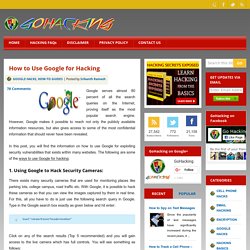
Free Online Course Materials. Free Courses. Socrates. Paste the text you want to speed read. The Institute of General Semantics. 12 Dozen Places To Educate Yourself Online For Free. Surfmark. HowStuffWorks "Learn How Everything Works!". Flashcards: The world's largest library of printable flash cards. Phraseup* - find the right words. A Study of Fairy Tales: Chapter I. The Worth of Fairy Tales.
Sacred Texts Miscellaneous Index Previous Next.
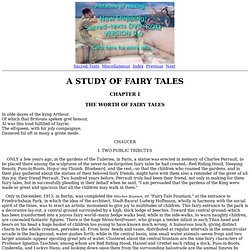
SparkNotes: Today's Most Popular Study Guides. Sexology. Sexology is the interdisciplinary study of human sexuality, including human sexual interests, behaviors and function.[1] The term sexology does not generally refer to the non-scientific study of sexuality, such as political science or social criticism.[2][3] In modern sexology, researchers apply tools from several academic fields, such as biology, medicine, psychology, epidemiology, sociology and criminology.
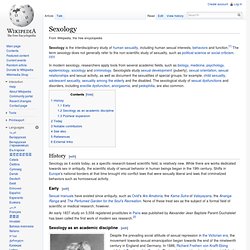
Sexologists study sexual development (puberty), sexual orientation, sexual relationships and sexual activity, as well as document the sexualities of special groups; for example, child sexuality, adolescent sexuality, sexuality among the elderly and the disabled. The sexological study of sexual dysfunctions and disorders, including erectile dysfunction, anorgasmia, and pedophilia, are also common.
Slavic mythology. Many generations of Slavic artists were inspired by their national folklore: Ilya Yefimovich Repin, Sadko in the Underwater Kingdom (1876) Slavic mythology is the mythological aspect of the polytheistic religion that was practised by the Slavs before Christianisation.
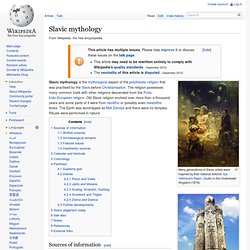
The religion possesses many common traits with other religions descended from the Proto-Indo-European religion. Old Slavic religion evolved over more than a thousand years and some parts of it were from neolithic or possibly even mesolithic times. The Earth was worshipped as Mat Zemlya and there were no temples. Rituals were performed in nature. Library of Congress Bibliographies, Research Guides, and Finding Aids (Virtual Programs & Services, Library of Congress)
Wonderful Google Tutorials and Lessons on Web Safety and Digital Citizenship. ThinkB4U is an online project created out of a partnership between Google Inc. and expert safety partners Common Sense Media, ConnectSafely, and the National Consumers League.
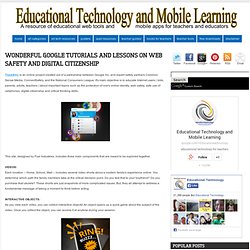
It's main objective is to educate Internet users ( kids, parents, adults, teachers ) about important topics such as the protection of one's online identity, web safety, safe use of cellphones, digital citizenship and critical thinking skills. This site, designed by Fuel Industries, includes three main components that are meant to be explored together. VIDEOS:Each location -- Home, School, Mall -- includes several video shorts about a modern family's experience online. You determine which path the family members take at the critical decision point. Exception paradox. In the exception paradox, the statement "every rule has an exception" leads to a contradiction.
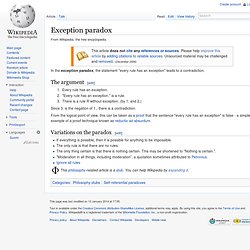
The argument[edit] Every rule has an exception. "Every rule has an exception. " is a rule.There is a rule R without exception. (by 1. and 2.) What is Chaos? An Interactive Online Course for Everyone. Learn.Genetics™ RegularGeek. Freeology - Free School Stuff. How to use a semicolon. E-learning. Digital Scriptorium. Learning 3.0 and the Smart eXtended Web. Main Page - Astrowiki-en. 30 Websites that Pay You to Contribute an Article, Instantly. ELI Resources. 7 Things You Should Know About The 2016 Key Issues in Teaching and Learning February 11, 2016 Since 2011, ELI’s Key Issues survey has been a way for the higher education teaching and learning community to discover the common ground that cuts across differences such as Carnegie Classific… 2016 Horizon Report.
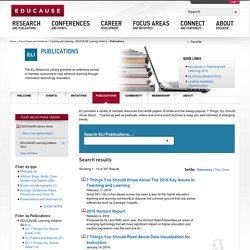
Pearltrees for teachers. Year 2012 last post is a guest post from Finnish teacher Tommi Viljakainen.
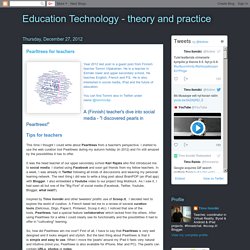
He is a teacher in Elimäki lower and upper secondary school. He teaches English, French and P.E. He is also interested in social media, iPad and the future of education. Learn More - Just BASIC. Top 14 websites for students. The Ultimate Student Resource List. It’s back to school time, yet again.
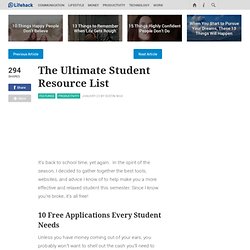
In the spirit of the season, I decided to gather together the best tools, websites, and advice I know of to help make you a more effective and relaxed student this semester. Websites For Students: 10 Online Learning Tools. When I was in elementary school I was very annoyed by all this studying.
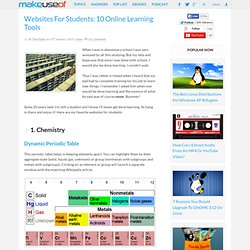
But my idea and hope was that once I was done with school, I would also be done learning. I couldn’t wait. SPEED. Speed-Reading Techniques. 50 Things Everyone Should Know How To Do. Ditch the Backpack: 100 Essential Web Tools for Virtual Students. While learning at home offers great opportunities for working on your own time and schedule, it can also offer drawbacks when it comes to working with others or getting immediate help on a problem. Whether you need help, collaboration, or just want a little extra knowledge when completing your assignments, these web tools will help you find what you need.
From note taking to researching to staying organized, the following resources will have you making top grades in your classes. Collaboration. Sites for Teachers. 10 Free Online Resources for Science Teachers. One of the greatest ways technology can empower teachers is by helping them demonstrate concepts and by making it easier for students to learn through their own exploration and experimentation.
Because science teachers are often called upon to teach topics that are too large, too small, happen too fast, happen too slowly, require equipment that is too expensive, or has the potential to blow up a laboratory, the Internet can be particularly helpful in assisting them convey a concept. Universities, non-profit organizations and scientists with free time have put an overwhelming number of resources for teaching science on the web. These are nine of our favorites. 1. The Periodic Table of Videos A group of scientists based at the University of Nottingham added some character to the static periodic table of elements by creating a short video for each one. The group also puts out a non-YouTube version of the site for schools that have blocked the site.
7 Free Education Websites You Don't Want to Miss. No Excuse List. Where to Get the Best Free Education Online. Top 50 Free Open Source Classes on Computer Science : Comtechtor. Computer science is an interesting field to go into. There are a number of opportunities in computer science that you can take advantage of.
With computers increasingly becoming a regular part of life, those who can work with computers have good opportunities. You can find a good salary with a program in computer science, and as long as you are careful to keep up your skills. Here are 50 free opencourseware classes that can help you learn more about computer science: Introduction to Computer Science Learn the basics of computer science, and get a foundation in how computer science works. Introduction to Computer Science: Learn about the history of computing, as well as the development of computer languages. Comprehensive Computer Science Collections If you are interested in courses that are a little more comprehensive in nature, you can get a good feel for computer science from the following collections: Programming and Languages Computer Software Computer Systems and Information Technology.